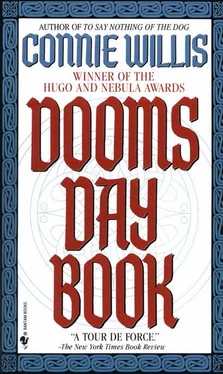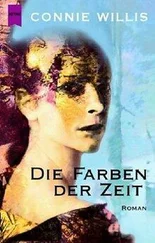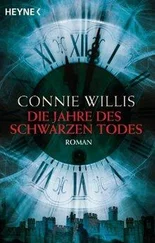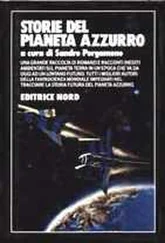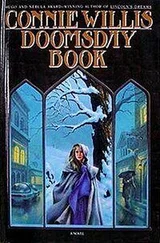“No,” he said, but he was already beginning to shiver.
“Perhaps you’re just tired,” Colin said. “You rest, and I’ll be back in a moment.”
He went out, pushing the shed’s door shut behind him. The stallion was nibbling the oats Colin had spilled, taking noisy, chomping bites. Dunworthy stood up, holding to the rough beam, and went over to the little casket. The brass bindings had tarnished and the leather on the lid had a small gouge in it, but otherwise it looked brand-new.
He sat down beside it and opened the lid. The steward had used it for his tools. There was a coil of leather rope in it and a rusty mattock head. The blue cloth lining Gilchrist had talked about in the pub was torn where the mattock had lain against it.
Colin came back in, carrying the bucket. “I brought you some water,” he said. “I got it out of the stream.” He set the bucket down and fumbled in his pockets for a bottle. “I’ve only got ten aspirin, so you can’t have much of a relapse. I stole them from Mr. Finch.”
He shook two into his hands. “I stole some synthomycin, too, but I was afraid it hadn’t been invented yet. I figured they had to have had aspirin.” He handed the aspirin tablets to Dunworthy and brought the bucket over. “You’ll have to use your hand. I thought the contemps’ bowls and things were probably full of plague germs.”
Dunworthy swallowed the aspirin and scooped a handful of water out of the bucket to wash it down. “Colin,” he said.
Colin took the bucket over to the stallion. “I don’t think this is the right village. I went in the church and the only tomb in there was of some lady.” He pulled the map and the locator out of another pocket. “We’re still too far east. I think we’re here,” he pointed at one of Montoya’s notes, “so if we go back to that other road and then cut straight east—”
“We’re going back to the drop,” he said. He stood up carefully, not touching the wall or the trunk.
“Why? Badri said we had a day at least, and we’ve only checked one village. There are lots of villages. She could be in any of them.”
Dunworthy untied the stallion.
“I could take the horse and go look for her,” Colin said. “I could ride really fast and look in all these villages and then come back and tell you as soon as I find her. Or we could split up the villages and each take half, and whoever finds her first could send some kind of signal. We could light a fire or something and then the other one would see it and come.”
“She’s dead, Colin. We’re not going to find her.”
“Don’t say that!” Colin said, and his voice sounded high and childish. “She isn’t dead! She had her inoculations!”
Dunworthy pointed at the leather casket. “This is the casket she brought through.”
“Well, what if it is?” Colin said. “There could be lots of chests like it. Or she could have run away, when the plague came. We can’t go back and just leave her here! What if it was me that was lost and I waited and waited for somebody to come and nobody did?” His nose had begun to run.
“Colin,” Dunworthy said helplessly, “sometimes you do everything you can, and you still can’t save them.”
“Like Great-Aunt Mary,” Colin said. He swiped at his tears with the back of his hand. “But not always.”
Always, Dunworthy thought. “No,” he said. “Not always.”
“Sometimes you can save them,” Colin said stubbornly.
“Yes,” he said. “All right.” He tied the stallion up again. “We’ll go and look for her. Give me two more aspirin, and let me rest a bit till they take effect, and we’ll go and look for her.”
“Apocalyptic,” Colin said. He grabbed the bucket away from the stallion, who had gone back to slurping it. “I’ll fetch some more water.”
He went running out, and Dunworthy eased himself to sitting against the wall. “Please,” he said. “Please let us find her.”
The door opened slowly. Colin, standing in the light, was outlined in radiance. “Did you hear it?” he demanded. “Listen.”
It was a faint sound, muffled by the walls of the shed. And there was a long pause between peals, but he could hear it. He stood up and went outside.
“It’s coming from over there,” Colin said, pointing toward the southwest.
“Get the stallion,” Dunworthy said.
“Are you certain it’s Kivrin?” Colin said. “It’s the wrong direction.”
“It’s Kivrin,” he said.
The bell stopped before they even got the stallion saddled. “Hurry!” Dunworthy said, cinching the girth strap.
“It’s all right,” Colin said, looking at the map. “It rang three times. I’ve got a fix on it. It’s due southwest, right? And this is Henefelde, right?” He held it in front of Dunworthy, pointing to each place in turn. “Then it’s got to be this village here.”
Dunworthy glanced at it and then toward the southwest again, trying to keep the direction of the bell clear in his mind. He was already unsure of it, though he could still feel the throbbing of its tolling. He wished the aspirin would take effect soon.
“Come on, then,” Colin said, pulling the stallion over to the door of the shed. “Get on, and let’s go.”
Dunworthy put his foot in the stirrup and swung the other leg over. He was instantly dizzy. Colin looked speculatively at him, and then said, “I think I’d better drive,” and swung himself up in front of Dunworthy.
Colin’s kick on the stallion’s flanks was too gentle and his yanking on the reins too violent but the stallion, amazingly, moved off docilely across the green and onto the lane.
“We know where the village is,” Colin said confidently. “All we need to find is a road that goes in that direction,” and almost immediately declared that they had found it. It was a fairly wide path, and it led down a slope and into a stand of pines, but only a few yards into the trees it split in two, and Colin looked questioningly back at Dunworthy.
The stallion didn’t hesitate. It started off down the right-hand path. “Look, it knows where it’s going,” Colin said delightedly.
I’m glad one of us does, Dunworthy thought, pressing his eyes shut against the jouncing landscape and the throbbing. The stallion, given its head, was obviously going home, and he knew he should tell Colin that, but the illness was closing him in again, and he was afraid to let go of Colin’s waist for even a moment, for fear the fever would get away from him. He was so cold. That was the fever, of course, the throbbing, the dizziness, they were all the fever, and a fever was a good sign, the body marshalling its forces to fight off the virus, assembling the troops. The chill was only a side-effect of the fever.
“Blood, it’s getting colder,” Colin said, pulling his coat closed with one hand. “I hope it doesn’t snow.” He let go of the reins altogether and pulled his muffler up around his mouth and nose. The stallion didn’t even notice. It plodded steadily ahead through deeper and deeper woods. They came to another fork and then another, and each time Colin consulted the map and the finder, but Dunworthy couldn’t tell which fork he chose or whether the horse had simply kept on in the direction it had set.
It began to snow, or they rode into it. All at once it was snowing, small steady flakes that obscured the path and melted on Dunworthy’s spectacles.
The aspirin began to take effect. Dunworthy sat up straighter and pulled his own cloak about him. He wiped his spectacles on the tail of it. His fingers were numb and bright red. He rubbed his hands together and blew on them. They were still in the woods, and the path was narrower than when they started.
Читать дальше
